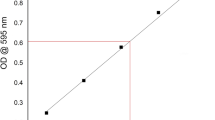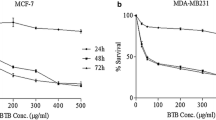Abstract
The aim of the study was to examine the anticancer activities of banana lectin (BanLec) from the ripen pulp of Musa paradisiaca. In this investigation, we have analyzed the cytotoxicity of BanLec against Vero, HepG2 and THP-1 cell lines. Among these, BanLec exhibited a potent cytotoxicity against THP-1cells, with an IC50 value of 244.38 µg/mL followed by HepG2 with an IC50 of 504.83 µg/mL and no cytotoxic activity towards Vero cells. Moreover, in this study we have evaluated the cell death mechanism induced by BanLec on THP-1cells. These cells were treated with 244.38 µg/mL concentration of BanLec to induce cell death at 24 h incubation. The apoptotic induction was carried out by Annexin V, DAPI staining, TUNEL assay and gene expression studies by qRT-PCR. BanLec induced apoptosis with morphological changes such as cell membrane blebbing, cell shrinkage, chromatin condensation, cell budding and nuclei broken into fragments. The caspase-3 gene expression was upregulated indicating the induction of apoptosis on treatment with BanLec. Using flow cytometry technique, the number of apoptotic cells in G0/G1 phase was evaluated. There was an accumulation and increase in the percentage of cells in G0/G1 phase stating the apoptosis induction against THP-1 cells. On conclusion BanLec showed an apoptosis induction in THP-1 cells in a caspase dependent manner. These collectively results evidently showed that the BanLec exerts cytotoxicity and apoptosis against THP-1 cells. It seems to be one of the potent anticancer compound having a possible therapeutic potential against the human leukemia derived diseases.
Graphical abstract









Similar content being viewed by others
References
Ahn KS, Sethi G, Jain AK, Jaiswal AK, Aggarwal BB (2006) Genetic deletion of NAD(P)H: quinone oxidoreductase 1 abrogates activation of nuclear factor-kappaB, IkappaBalpha kinase, c-Jun N-terminal kinase, Akt, p38, and p44/42 mitogen-activated protein kinases and potentiates apoptosis. J Biol Chem 281:19798–19808. https://doi.org/10.1074/jbc.M601162200
Alley MC, Scudiere DA, Monks A, Czerwinski M, Boyd SR, MR, (1986) Validation of an automated microculture tetrazolium assay (MTA) to assess growth and drug sensitivity of human tumor cell lines. Proc Am Assoc Cancer Res 27:389–391
Andrew T (2008) Apoptosis and autophagy: regulatory connections between two supposedly different processes. Apoptosis 13:1–9. https://doi.org/10.1007/s10495-007-0154-9
Asokan A, Thangavel M (2014) In vitro cytotoxic studies of crude methanolic extract of Saraca indica bark extract. IOSR J Pharm Biol Sci 9:26–30. https://doi.org/10.9790/3008-09412630
Atanasov AG, Zotchev SB, Dirsch VM, International Natural Product Science Taskforce, Supuran CT (2021) Natural products in drug discovery: advances and opportunities. Nat Rev Drug Discov 20:200–216. https://doi.org/10.1038/s41573-020-00114-z
Batcha ATM, Wadhwani A, Subramaniam G (2020) In vitro antiviral activity of BanLec against herpes simplex viruses type 1 and 2. Bangladesh J Pharmacol 15:11–18. https://doi.org/10.3329/bjp.v15i1.42320
Boleti AP, Ventura CA, Justo GZ, Silva RA, de Sousa AC, Ferreira CV, Yano T, Macedo ML (2008) Pouterin, a novel potential cytotoxic lectin-like protein with apoptosis-inducing activity in tumorigenic mammalian cells. Toxicon 51(8):1321–1330. https://doi.org/10.1016/j.toxicon.2008.03.007
Chambers JP, Arulanandam BP, Matta LL, Weis A, Valdes JJ (2008) Biosensor recognition elements. Curr Issues Mo Biol 10:1–12
Chan YS, Wong JH, Fang EF, Pan W, Ng TB (2012) Isolation of a glucosamine binding leguminous lectin with the mitogenic activity towards splenocyte and antiproliferative activity towsards splenocytes and antiproliferative activity towards tumor cells. PLoS ONE 7:e38961. https://doi.org/10.1371/journal.pone.0038961
Cheung AH, Wong JH, Ng TB (2009) Musa acuminata (Del Monte banana) lectin is a fructose-binding lectin with cytokine-inducing activity. Phytomedicine 16:594–600. https://doi.org/10.1016/j.phymed.2008.12.016
Darzynkiewicz Z, Bruno S, Del Bino G, Gorczyca W, Hotz MA, Lassota P, Traganos F (1992) Features of apoptotic cells measured by flow cytometry. Cytometry 13:795–808. https://doi.org/10.1002/cyto.990130802
De Mejia EG, Prisecaru VI (2005) Lectins as bioactive proteins: a potential in cancer treatment. Crit Rev Food Sci Nutr 45:425–445. https://doi.org/10.1080/10408390591034445
Deepa M, Sureshkumar T, Satheeshkumar PK, Priya S (2012) Purified mulberry leaf lectin (MLL) induces apoptosis and cell cycle arrest in human breast cancer and colon cancer cells. Chem Biol Interact 200(1):38–44. https://doi.org/10.1016/j.cbi.2012.08.025
Gastman B, Wang K, Han J, Zhu ZY, Huang XJ, Wang GQ, Rabinowich H, Gorelik E (2004) A novel apoptotic pathway as defined by lectin cellular initiation. Biochem Biophys Res Commun 316:263–271. https://doi.org/10.1016/j.bbrc.2004.02.043
Goldstein IJ, Winter HC, Mo H, Misaki A, Van Damme EJ, Peumans WJ (2001) Carbohydrate binding properties of banana (Musa acuminata) lectin II. Binding of laminaribiose oligosaccharides and beta-glucans containing beta 1,6-glucosyl end groups. Eur J Biochem 268(9):2616–2619. https://doi.org/10.1046/j.1432-1327.2001.02149.x
Gorelik E, Galili U, Raz A (2001) On the role of cell surface carbohydrates and their binding proteins (lectins) in tumor metastasis. Cancer Metastasis Rev 20:245–277. https://doi.org/10.1023/A:1015535427597
Gupta N, Bisen PS, Bhagyawant SS (2018) Chickpea lectin inhibits human breast cancer cell proliferation and induces apoptosis through cell cycle arrest. Protein Pept Lett 25:492–499. https://doi.org/10.2174/0929866525666180406142900
Heinrich EL, Welty LA, Banner LR, Oppenheimer SB (2005) Direct targeting of cancer cells: a multiparameter approach. Acta Histochem 107:335–344. https://doi.org/10.1016/j.acthis.2005.06.013
Hengartner M (2000) The biochemistry of apoptosis. Nature 407:770–777. https://doi.org/10.1038/35037710
Hostanska K, Vuong V, Rocha S, Soengas MS, Glanzmann C, Saller R, Bodis S, Pruschy M (2003) Recombinant mistletoe lectin induces p53-independent apoptosis in tumor cells and cooperates with ionising radiation. Br J Cancer 88:1785–1792. https://doi.org/10.1038/sj.bjc.6600982
Huang LH, Yan QJ, Kopparapu NK, Jiang ZQ, Sun Y (2012) Astragalus membranaceus lectin (AML) induce caspase-dependent apoptosis in human leukemia cells. Cell Prolif 45:15–21. https://doi.org/10.1111/j.1365-2184.2011.00800.x
Koshte VL, van Dijk W, van der Stelt ME, Aalberse RC (1990) Isolation and characterization of BanLec-I, a mannoside-binding lectin from Musa paradisiaca (banana). Biochem J 272:721–726. https://doi.org/10.1042/bj2720721
Lam SK, Ng TB (2010) First report of a haemagglutinin-induced apoptotic pathway in breast cancer cells. Biosci Rep 30:307–317. https://doi.org/10.1042/BSR20090059
Lannoo N, Van Damme EJ (2010) Nucleocytoplasmic plant lectins. Biochim Biophys Acta 1800:190–201. https://doi.org/10.1016/j.bbagen.2009.07.021
Lavastre V, Chiasson S, Cavalli H, Girard D (2005) Viscum album agglutinin-I (VAA-I) induces apoptosis and degradation of cytoskeletal proteins in human leukemia PLB-985 and X-CGD cells via caspases: lamin B1 is a novel target of VAA-I. Leukemia Res 29:1443–1453. https://doi.org/10.1016/j.leukres.2005.05.014
Li WW, Yu JY, Xu HL, Bao JK (2011) Concanavalin A: a potential anti-neoplastic agent targeting apoptosis, autopagy and anti-angiogenesis for cancer therapeutics. Biochem Biophys Res Commun 414:282–286. https://doi.org/10.1016/j.bbrc.2011.09.072
Li F, Shanmugam MK, Chen L, Chatterjee S, Basha J, Kumar AP, Kundu TK, Sethi G (2013) Garcinol, a polyisoprenylated benzophenone modulates multiple proinflammatory signaling cascades leading to the suppression of growth and survival of head and neck carcinoma. Cancer Prev Res 6:843–854. https://doi.org/10.1158/1940-6207.CAPR-13-0070
Liu Z et al (2008) A mannose—binding lectin from Sophora flavescens induces apoptosis in HeLa cells. Phytomedicine 15:867–875. https://doi.org/10.1016/j.phymed.2008.02.025
Liu B, Cheng Y, Zhang B, Bian HJ, Bao JK (2009) Polygonatum cyrtonema lectin induces apoptosis and autophagy in human melanoma A375 cells through a mitochondria-mediated ROS–p38–p53 pathway. Cancer Lett 275:54–60. https://doi.org/10.1016/j.canlet.2008.09.042
Liu B, Bian HJ, Bao JK (2010a) Plant lectins: potential anti neoplastic drugs from bench to clinic. Cancer Lett 287:1–12. https://doi.org/10.1016/j.canlet.2009.05.013
Liu B, Wu J, Li J, Liu J, Li W, Li C, Xu H, Bao J (2010b) Polygonatum cyrtonema lectin induces murine fibrosarcoma L929 cell apoptosis via blocking Ras-Raf and PI3K-Akt signalling pathways. Biochimie 92:1934–1938. https://doi.org/10.1016/j.biochi.2010.08.009
Liu Z, Luo Y, Zhou TT, Zhang WZ (2013) Could plant lectins become promising anti-tumour drugs for causing autophagic cell death? Cell Prolif 46:509–515. https://doi.org/10.1111/cpr.12054
Lyu SY, Choi SH, Park WB (2002) Korean mistletoe lectin-induced apoptosis in Hepatocarcinoma cells is associated with inhibition of telomerase via mitochondrial controlled pathway independent of p53. Arch Pharmacal Res 25:93–101. https://doi.org/10.1007/BF02975269
Mo H, Winter HC, Van Damme EJ, Peumans WJ, Misaki A, Goldstein IJ (2001) Carbohydrate binding properties of banana (Musa acuminata) lectin I. Novel recognition of internal alpha1,3-linked glucosyl residues. Eur J Biochem 268(9):2609–2615. https://doi.org/10.1046/j.1432-1327.2001.02148.x
Newman DJ, Cragg GM (2020) Natural products as sources of new drugs over the nearly four decades from 01/1981 to 09/2019. J Nat Prod 83:770–803. https://doi.org/10.1021/acs.jnatprod.9b01285
Oliveira C, Nicolau A, Teixeira JA, Domingues L (2011) Cytotoxic effects of native and recombinant frutalin, a plant galactose- binding lectin, on Hela cervical cancer cells. J Biomed Biotechno. https://doi.org/10.1155/2011/568932
Otsuki Y, Li Z, Shibata M (2003) Apoptotic detection methods—from morphology to gene. Prog Histochem Cytochem 38:275–340. https://doi.org/10.1016/S0079-6336(03)80002-5
Pachuau L, Atom AD, Thangjam R (2014) Genome classification of Musa cultivars from Northeast India as revealed by ITS and IRAP markers. Appl Biochem Biotechnol 172:3939–3948. https://doi.org/10.1007/s12010-014-0827-0
Peumans WJ, Van Damme EJ (1996) Prevalence, biological activity and genetic manipulation of lectins in foods. Trends Food Sci Technol 7:132–138. https://doi.org/10.1016/0924-2244(96)10015-7
Peumans WJ et al (2000) Fruit-specific lectins from banana and plantain. Planta 211(4):546–554. https://doi.org/10.1007/s004250000307
Puar YR, Shanmugam MK, Fan L, Arfuso F, Sethi G, Tergaonkar V (2018) Evidence for the involvement of the master transcription factor NF-κB in cancer initiation and progression. Biomedicines. https://doi.org/10.3390/biomedicines6030082
Pusztai A, Bardocz S, Ewen SWB (2008) Uses of plant lectin in bioscience and biomedicine. Front Biosci 13(3):1130–1140. https://doi.org/10.2741/2750
Salvesan GS, Dixit VM (1999) Caspase activation: the induced –proximity model. Proc Natl Acad Sci USA 96:10964–10967. https://doi.org/10.1073/pnas.96.20.10964
Sampath Kumar KP, Bhowmik D, Duraivel S, Umadevi M (2012) Traditional and medicinal uses of Banana. J Pharmacogn Phytochem 1:57–70
Shahidi-Noghabi S, Van Damme EJ, Iga M, Smagghe G (2010) Exposure of insect midgut cells to Sambucus nigra L. agglutinins I and II causes cell death via caspase-dependent apoptosis. J Insect Physiol 56:1101–1107. https://doi.org/10.1016/j.jinsphys.2010.03.012
Sharma A, Chandran D, Singh DD, Vijayan M (2007) Multiplicity of carbohydrate-binding sites in β-prism fold lectins: occurrence and possible evolutionary implications. J Biosci 32:1089–1110. https://doi.org/10.1007/s12038-007-0111-3
Singh DD, Saikrishnan K, Kumar P, Surolia A, Sekar K, Vijayan M (2005) Unusual sugar specificity of banana lectin from Musa paradisiaca and its probable evolutionary origin. Crystallogr Model Stud Glycobiol 10:1025–1032. https://doi.org/10.1093/glycob/cwi087
Singh SS, Devi SK, Ng TB (2014) Banana Lectin: a brief review. Molecules 19:18817–18827. https://doi.org/10.3390/molecules191118817
Singh R, Nawale L, Sarkar D, Suresh CG (2016) Two chitotriose-specific lectins show anti-angiogenesis, induces caspase-9- mediated apoptosis and early arrest of pancreatic tumor cell cycle. PLoS ONE 11(1):e0146110. https://doi.org/10.1371/journal.pone.0146110
Thies A, Dautel P, Meyer A, Pfüller U, Schumacher U (2008) Low-dose mistletoe lectin-I reduces melanoma growth and spread in a scid mouse xenograft model. Br J Cancer 98:106–112. https://doi.org/10.1038/sj.bjc.6604106
Winter HC, Oscarson S, Slattegard R, Goldstein TM, IJ, (2005) Banana lectin is unique in its recognition of the reducing unit of 3-O-β-glucosyl/mannosyl diasacchrides; a calorimetric study. Glycobiology 15(10):1043–1050. https://doi.org/10.1093/glycob/cwi074
Yan QJ, Zhu LF, Kumar N, Jiang ZQ, Huang LH (2010) Characterisation of a novel monomeric lectin (AML) from Astragalus membranaceus with anti-proliferative activity. Food Chem 122:589–595. https://doi.org/10.1016/j.foodchem.2010.03.015
Zhang G, Gurtu V, Kain SR, Yan G (1997) Early detection of apoptosis using a fluorescent conjugate of annexin V. Biotechniques 23:525–531. https://doi.org/10.2144/97233pf01
Zhang ZT, Peng H, Li CH, Liu JJ, Zhou TT, Yan YF, Li Y, Bao JK (2010) Polygonatum cyrtonema lectin induces murine fibrosarcoma L929 cell apoptosis via a caspase-dependent pathway as compared to Ophiopogon japonicus lectin. Phytomedicine 18:25–31. https://doi.org/10.1016/j.phymed.2010.05.013
Acknowledgements
The authors wish to acknowledge the Department of Biochemistry, DST FIST lab of Dr. N.G.P Arts and Science College, India. Communication No: DrNGPASC 2019-20 BS024
Funding
Funding not available to this article
Author information
Authors and Affiliations
Corresponding author
Ethics declarations
Ethical statement
This article does not contain any studies with human participants or animals performed by any of the authors.
Conflict of interest
Arisha Taj Mahaboob Batcha has no conflict of interest. Gowri Subramaniam has no conflict of interest. Karthikkumar Venkatachalam has no conflict of interest.
Additional information
Publisher's Note
Springer Nature remains neutral with regard to jurisdictional claims in published maps and institutional affiliations.
Rights and permissions
About this article
Cite this article
Mahaboob Batcha, A.T., Subramaniam, G. & Venkatachalam, K. Purified Banana lectin (BanLec) isolated from the ripen pulp of Musa Paradisiaca induces apoptosis in cancer cell lines: in vitro study. ADV TRADIT MED (ADTM) 23, 589–604 (2023). https://doi.org/10.1007/s13596-022-00637-3
Received:
Accepted:
Published:
Issue Date:
DOI: https://doi.org/10.1007/s13596-022-00637-3




